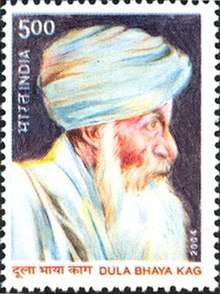Dula Bhaya Kag
Dula Bhaya Kag (25 November 1902 – 22 February 1977) was an Indian poet, songwriter, writer and artist born in 1902 in Sodvadari village,[1] a village in the Saurashtra region, near Mahuva in the Indian state of Gujarat. He was of the Charan (Gadhvi) caste and is mainly known for his work on spiritual poetry relating to Hinduism. He was facilitated with Padmashree award in the year 1962.
Dula Bhaya Kag | |
|---|---|
 | |
| Born | 25 November 1902 Sodvadari Village, Saurashtra, Gujarat, India |
| Died | 22 February 1977 (aged 74) |
| Pen name | Kag |
| Occupation | Farmer, writer |
| Nationality | Indian |
| Period | 1902 - 1977 |
| Subject | Hinduism, Spiritualism, Gandhism |
| Literary movement | Education, Bhudan |
| Notable works | Kagvani (Bhag 1-8), GuruMahima, Chandrabavni, Vinoba-Baavni, Sorath-Baavni |
| Notable awards | Padmashree Award (1962) |
| Children | Rambhai Dulabhai Kag |
| Website | |
| www | |
Early life
He was born in sodvadari, a village of his Maternal Parents."He was very shy in his childhood" told by his relative. Kag received a 5th-grade education before leaving to tend his family's cattle and farm. Eventually, he became involved in a nationalist movement and prohibition after the formation of Saurashtra State, causing him to donate his land to Vinoba Bhave’s Bhoodan Movement.
Career
Kag is known for publishing Kagvani, an eight-volume work consisting of devotional songs (episodes from the Ramayana and the Mahabharata), as well as songs based on Gandhian philosophy and the Bhoodan movement. He wrote eulogies for Mahatma Gandhi and Bhave. He also wrote many poems on Sonal Aai and Yogiji Maharaj the 4th spiritual successor of Bhagwan Swaminarayan in BAPS Swaminarayan Sanstha. He was also known as Bhagat Bapu and Kag Bapu.
One couplet from him may be helpful in feeling the depths and warmth of his pen...viz. "Ek ranga ne ujalaa, eeni bhitar beeji na bhaat,vahali-dawali waat, ene karje dil ni Kaagdaa(im Gujarati)" .... In English- "Those having single colour & stainless having no other hues inside, Are the ones to whom the innermost feelings (whether happy or painful) of your heart you can share O crow..." Crow/kaag is short name of poet saint of Majadar village between victor-mahuva, rechristened "Kagdham" in memory of him.....
As a result of his literary and political contributions to India, the country awarded him the Padma Shri award in 1962.[2]
Death and legacy
Kag died on 2 February 1977, at the age of 74. Despite his limited education, his poems are used from primary education to master's programs. On 25 November 2004, the Department of Posts released a commemorative stamp from Ahmedabad in denominations of ₹5 to mark his 102nd anniversary.[1] Kagdham village constructed a "Kag Dwar" at the entrance of Kagdham Village in memory of Kagbapu. Though he is dead, his legacy of poems is immortal.
Kavi Shree Dula Kag Memorial Trust
Kavi Kag family resides in Kagdham and Bhavnagar. They handle a Memorial Trust named Kavi Shree Dula Kag Memorial Trust which works for the programs and charity on name of Padmashree Dula Bhaya Kag. This Trust was established by Kagbapu's son Shree Rambhai Dulabhai Kag. Currently, the Managing Director of this trust is Shree Rajvirbhai Rambhai Kag. Many folk singers and loksahityakar are awarded with "Kavi Kag Award" for their excellence in the field of music and sahitya. It is organised every year at Kagdham with blessings of Pujya MorariBapu by the trust.
Kag Sahitya
With the transformation of technology and in order to cater to the needs of readers, Sahitya of Kavi Kag is posted on social media handles such as Facebook, Instagram and YouTube with the name "Kag Sahitya". These accounts are managed by Kag Family.
References
- "Centre approves renaming of Majadar village as Kagdham as tribute to great poet Dula Bhaya Kag". Deshgujarat.com. 16 August 2014. Retrieved 2 February 2016.
- "Padma Shri Awardees". Archived from the original on 16 July 2014. Retrieved 2 February 2016.